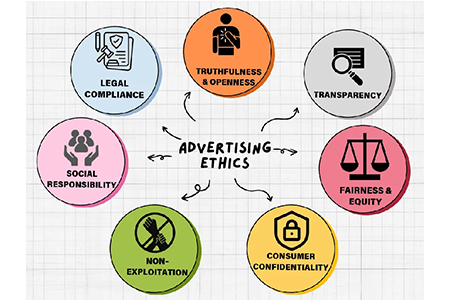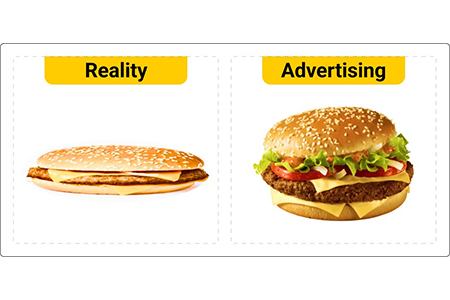Introduction
The concept of ethical advertising deals with the desire for promotion to become subject to integrity-clear, honest to a fault, and respectful of the audience. It engenders trust between business and consumer, which slowly becomes more than just a transactional bond. When the business engages in ethical behavior in advertising, it is not just conforming to the norm, it is speaking a language of honesty and transparency. This way, we have healthier markets, where consumers feel good about their choices, and businesses build a name over time. Increasingly in today’s world, with the prevalence of misinformation and false claims, ethics in advertising has never been so essential. It’s not just about pushing sales; it’s about doing it responsibly and with respect. When organizations adopt ethical guidelines in advertising, they demonstrate concern for their patrons, for their environment, and for their impact on society in the long run.
Core Ethical Principles in Advertising
The ethical advertisement focuses its cardinal principles on three: honesty, transparency, and social responsibility. These are vital in winning consumers' trust. Trusting and honest advertising must not misdirect consumers regarding the representation of the product or the service being offered, let alone mismatch any promises with what is delivered by a producer. Transparency is next in line: advertisements must offer unclouded, truthful information, with no underhand agenda or misleading rhetoric accompanying it. In advertising that considers the social impact, brands must factor in how their messages will touch various group implications with any real sense of advertisement sensibility. In a place like India, where cultural sensitivities remain strongly imbued, advertising ethics encompass respect towards various social norms and value systems. When individuals uphold such principles, such advertising transforms itself into an endorsement of good in society at large, besides inciting responsible consumption through advertising, not to mention sustainable behaviors essentially supporting the economic growth of that society. So, ethical advertising is certainly not just an act of abiding by the law; it is about respecting people and their constitutional freedom with regards to any message they deserve to hear.

Ethical Concerns in Different Advertising Strategies
Different advertising methods are bound to raise deep ethical concerns in cases where vulnerable audiences have been purposely manipulated or false claims are made. For example, children might be subject to ads while still in a developmental phase in which they have yet to make a clear distinction between entertainment and advertisement. Such advertising strategies cause unhealthy conditioning: for instance, excessive buying behavior or wanting products that may be unsuitable. Misleading claims that exaggerate the benefits of the product or downplay risks are just as troubling; they prevent consumer trust from developing and ruin the credibility of the advertising industry. Advertising-related ethical issues become troubling when manipulative techniques are employed directly per fear of insecurity to promote the sale of products. To avoid these pitfalls and create lasting relationships based on trust, businesses must instead focus on creating truthful and responsible advertisements centered on consumer well-being. Advertising ought to be ethical in that it promotes products fulfilling an honest need, while all claims would be true, properly substantiated, and presented in a manner fair to competition.
Industry Regulations and Ethical Guidelines
The intention of the marketers does not influence advertising practices, but rather, the regulations imposed by the law are the ultimate outside influence on advertising. These regulations have been framed for the benefit of the people to help promote advertising ethics in their favor. The advertisers' ethics and laws are being monitored in India by bodies like the Advertising Standards Council of India (ASCI), to whom the promotions are meant not to be outrightly false, embarrassing, or injurious. These laws define the parameters for the protection of common men from misleading claims and unethical practices. Self-regulation acts as a strong constraint in any industry. Many companies have been implementing their codes of conduct, which often extend beyond mere compliance with professional and legal considerations to embrace broader corporate principles of truth, transparency, and social responsibility. Thus, they do not only hold advertising accountable but also ensure its credibility. Through adherence to these rules, companies will also be able to protect their reputations, being aware that fair marketing is a cause worthy of support.

Addressing Ethical Dilemmas in Advertising
The founding principles of advertising often put the practitioner in a morally ambiguous position, where the business interests of the practitioner have to be weighed against maintaining the trust of the consumer. Think of a brand that faces a risk in advertising the exaggerated benefits of a particular product. Increased sales were at stake, but if the consumers felt they had been misled, then the brand image could be tarnished. Controversies may arise from the advertisement, leaving the brand with the choice of either supporting the ad or pulling it. This illustrates that ethical issues in advertising compel organizations to evaluate even the consequences of their decisions on their profit margin, beyond those ramifications to the society as a whole. Transparent communication and taking accountability for the message sent out usually present effective solutions to addressing issues. Ultimately, advertising campaigns should be designed in a manner that reflects corporate values while ensuring the communication of messages that do not manipulate the audience but rather cultivate genuine trust and loyalty over time.

The Future of Ethical Advertising
In the landscape of ethical advertising, the present holds an exciting transition toward authenticity, sustainability, and inclusiveness. The consumers, especially the younger lot generally considered, are concerned with ethics in whichever brand they want to associate with. This accords with advertising not only at the product level but also at the level of values such as environmental sustainability, fairness, and social justice. It will be no different in the advances of artificial intelligence and data analytics that continue to provide great spots and stumbling block opportunities to advertisers as they try targeting consumers. A case in point is the ethical management of data because consumers expect to see brands protective of their privacy and their personal information. Therefore, it becomes pertinent for brands to adopt the changes in this regard to reposition themselves ahead of the curve because digital advertising is witnessing phenomenal growth in India. The future of ethical advertising will be much dependent on selling ideas for a social good rather than on a growing consciousness among companies about their role in determining cultural and social trends.

Conclusion
Advertising should be a moral activity if it hopes to win the bond of trust, transparency, and responsibility. When ethical principles like being honest and doing social responsibilities are followed by the businesses, it creates a trust and mutual respect along with a deeper relationship with the consumer. Ethical issues in advertising affect consumers' trust in brands and the reputation of brands if not handled properly. Nevertheless, with the welfare of their audience in mind, marketers contribute not only to compliance but also to the emergence of a healthier and more transparent advertising environment. The past advertising landscape will change in very many ways, maintaining business integrity in broadcast messages that are persuasive, responsible, and truthful while positively contributing to the medium and society. The future of advertising will not only be about selling products but also about creating genuine market relationships to add social value.
FAQs
Advertisers should not use misleading information and false claims by ensuring that accurate, verifiable facts are revealed, thus allowing transparency, trust, and credibility to thrive all along the advertisement.
By taking into account the effects of their advertisement on vulnerable audiences and ensuring wider social well-being, they can advance good social values.
Advertisers must balance ethical, exploitative, and harmful against audience sensitivities. This involves treating sensitive topics with respect and fairness.
Advertising can influence consumer choice through desire or emotion but never manipulate consumer psychology to disrupt the capacity of the individual to make a personal choice or encourage unhealthy behavior.
By embracing diversity and celebrating inclusivity without stereotypical representation, brands can make sure that all audiences are respected and recognized.
Respecting privacy legislation, informed consent, and the equitable use of consumer information are means through which organizations can ethically gather, store, and use information.
By being consumer trust centered, by developing value based campaigns, and by fostering long term relationships, advertisers can align their ethical strategy with their business objectives.



